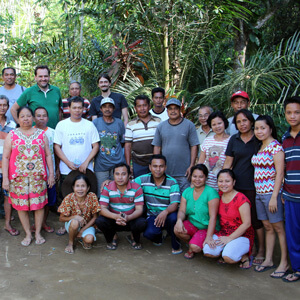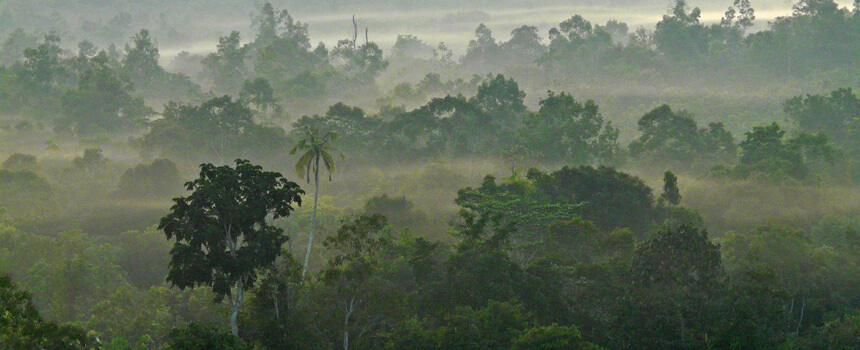 Mehr als nur Aufforstung - eine Zukunft für Mensch und Natur|More than reforestation - A future for people and nature
Mehr als nur Aufforstung - eine Zukunft für Mensch und Natur|More than reforestation - A future for people and nature
1 Million Bäume gegen Armut und Entwaldung auf Borneo|1 million trees to counter poverty and deforestation in Borneo
Indonesien, und besonders der indonesische Teil der Insel Borneo, Kalimantan, schreibt in den letzten Jahren im Zusammenhang mit Palmöl oft negative Schlagzeilen. Die Entwicklungen sind beängstigend: Natur und Mensch leiden immer stärker unter der zunehmenden Abholzung und der Veränderung des Regenwaldes mitsamt den sich ausbreitenden Monokulturen. Doch die Lage ist nicht hoffnungslos, Menschen vor Ort suchen Alternativen und wollen Veränderung schaffen. Der Handlungsbedarf ist groß. Mit dem Projekt "1 Million Bäume für Borneo" will Fairventures Worldwide Borneo wieder zur "grünen Lunge Asiens" machen. Zusammen mit den Bewohnern in den Projektdörfern trägt die Organisation dazu bei, dass diese Lunge nicht weiter kollabiert und das Klima wieder geschützt, anstatt weiter belastet wird.|Indonesia - and particularly Kalimantan, the Indonesian part of Borneo - has been making negative headlines in connection with palm oil. The way things are developing is frightening: nature and people are increasingly suffering as a result of the accelerating deforestation and the transformation of the rain forest through the spread of monocultures. But the situation is not hopeless: Local people are looking for alternatives and want to make a difference. The need for action is great. With the project "1 million trees for Borneo", Fairventures Worldwide is seeking to turn Borneo back into the "green lung of Asia". Together with the inhabitants of the project villages, the organisation is trying to prevent this lung from collapsing further, thereby protecting the climate rather than putting it under even more strain.
Necessity
Eine alternative Landnutzungsform, die den Bauern auf Borneo Erträge bringt und gleichzeitig den Regenwald schützt.|An alternative land use form that provides an income to farmers in Borneo, while also protecting the rain forest.
Activity
Fairventures Worldwide unterstützt gemeinsam mit einer lokalen NGO Bauern und Baumschulen bei der Aufzucht von Setzlingen und dem Anlegen von nachhaltigen Holzplantagen.|Together with a local NGO, Fairventures Worldwide supports farmers and tree nurseries in growing seedlings and establishing sustainable timber plantations.
Countable effort
4500 Setzlinge werden verteilt und gepflanzt, 40 Bauern sind im Rahmen der Durchführung beschäftigt und 6,6 Hektar Regenwald können aufgeforstet werden.|4.500 seedlings are distributed and planted, involving 40 farmers and reforesting 6.6 hectares of rain forest.
Result
40 Bauern und Baumschulen generieren Einkommen unabhängig von z.B. der Palmölindustrie. Es entsteht eine nachhaltige Wirtschaft im Einklang mit der Natur.|40 farmers and tree nurseries generate an income that is independent of, for instance, the palm oil industry and establish a sustainable economy in balance with nature.
Systemic effect
Die alternative Form der Landnutzung etabliert sich, Bauern haben nachhaltige Einkommensquellen. Ein langfristiger Beitrag zum Klimaschutz wird geleistet.|The alternative land use form establishes and the farmers have a sustainable source of income. A long-term contribution to climate protection can be made.
Background
Holzeinschlag (legal und illegal), Ölplantagen und Bevölkerungsdruck haben in den letzten 25 Jahren die Wälder Indonesiens stark dezimiert. Allein zwischen 1990 und 2005 ist die bewaldete Fläche in Indonesien um 20% zurückgegangen. Noch immer verschwinden die tropischen Regenwälder in keinem Land der Welt schneller als in Indonesien (GIZ, 2015). Eine besonders betroffene Region ist die Insel Borneo, wo die Raten der Entwaldung noch wesentlich höher liegen als im Rest des Landes. Die Ursache für die Entwaldung ist zu einem großen Teil in den Industrieländern auszumachen: Die EU ist einer der größten Importeure von Produkten, die aus illegaler Abholzung stammen. 25 % dieser durch illegale Abholzung gewonnen Importe stammen aus Indonesien, dabei handelt es sich hauptsächlich um Palmöl. Deutschland ist gemeinsam mit den Niederlanden der größte Palmölkonsument in der EU. Dies liegt zum einen an der großflächigen Verwendung von Palmöl in der Lebensmittelindustrie, zum anderen daran, dass wir für unseren Biosprit Palmöl verwenden (fern, 2015). Der Verlust des Waldes hat schwerwiegende Konsequenzen für die Biodiversität in Borneo: Orang-Utans und Waldelefanten sind nur die prominentesten Opfer der Entwaldung. Auch die einheimische Bevölkerung, die Dayak, hat seit Jahrhunderten ihr Leben im Einklang mit dem Wald geführt, und so nachhaltig wirtschaftend Lebensmittel, Medizinpflanzen und Baustoffe gewonnen. Durch den Verlust der Biokapazität des Ökosystems, also der Fähigkeit der Natur, Nahrungsmittel, Wasser und vieles mehr bereitzustellen, verliert die lokale Bevölkerung ihre natürlichen Lebensgrundlagen. Anstelle von Wäldern treten vielerorts Monokulturplantagen, z.B. Palmöl, die den Boden zerstören und deren Gewinne nicht der lokalen Bevölkerung zugutekommen.|Logging (both legal and illegal), palm oil plantations and population growth have massively decimated the rain forests of Indonesia. Between 1990 and 2005, the area covered by forest has declined by 20%. No country in the world is losing tropical rain forest faster than Indonesia (GIZ, 2015). A part that is particularly affected is the island of Borneo, where deforestation rates are much higher than in the rest of the country. The cause for this development lies mostly in the industrialised countries: the EU is one of the major importers of products resulting from illegal logging. 25% of these are imported from Indonesia, the majority being palm oil. Together with the Netherlands, Germany is the EU’s largest consumer of palm oil. On the one hand, this comes from the widespread use of palm oil in processed foods, on the other, it is being used for producing bio fuels (Fern, 2015). Losing the forest has serious consequences for biodiversity in Borneo: the orangutan and the forest elephant are just the most prominent victims of deforestation. The indigenous people, the Dayak, have been living in harmony with the forest for centuries and have taken food, medicinal plants and building materials from the forest in a sustainable way. As a result of the lost bio capacity of the ecosystem, the local people lose their natural resources. In many places, forests are replaced by monoculture plantations, e.g. for palm oil, which destroy the soil and whose profits do not benefit the locals.
The good deed
Degradierte Flächen werden aufgeforstet, so wird auf die fortschreitende Entwaldung und damit verbundene verheerende Konsequenzen für Mensch, Tier und Natur reagiert. Lokale Baumschulen und Bauern ziehen Setzlinge auf und pflanzen sie, wodurch die Bevölkerung von Anfang an integriert ist. So verbessern sie eigenständig ihre Lebensgrundlage und das Programm wird nachhaltig verankert. Die Bäume leisten durch ihre Fähigkeit, Kohlenstoff zu speichern, einen wichtigen Beitrag zum Klimaschutz.|Degraded land is reforested in order to counteract the advancing deforestation and the devastating consequences for people, animals and the ecosystem that go along with it. Local tree nurseries grow seedlings and the respective farmers plant them, which helps to get the locals involved right from the beginning. That way, they themselves have a positive impact on their livelihoods and the programme becomes firmly rooted in the community. Through their ability to absorb carbon, trees are an important factor against climate change.
Challenge
Im Vergleich zu umweltschädlicheren Formen der Landnutzung (z.B. Palmölplantagen) ist die Pflanzung von Bäumen ein Modell, das erst mittelfristig Erträge für die Bauern bringt, aber dafür langfristig. Eine Schlüsselherausforderung ist es daher, die Menschen vor Ort für das Projekt als alternative Landnutzungsform zu gewinnen und ihnen die kurz- und langfristigen Folgen und ihren Nutzen deutlich zu machen. Die Organisation arbeitet eng mit lokalen Partnern zusammen, um kultursensibel zu kommunizieren. Die Baumpflanzungen werden mit einjährigen Früchten und Gemüse ergänzt, die schnell Vorteile bringen.|Compared to more harmful forms of land use (such as palm oil plantations), planting trees is a business model that only starts yielding benefits to the farmers in the medium term, but continues to do so for a long time. Therefore, a key challenge is to involve the local population in the project, and to raise awareness for its short- and long-term consequences and benefits. In order to communicate in a culturally sensitive way, the organisation closely collaborates with local partners. In addition to the trees, fruits and vegetables are cultivated that are quicker to yield benefits.

AboutIndonesien|Indonesia
Jakarta|Jakarta
Capital
249 865 600|249 865 600
Number of inhabitants
3 534 USD|3 534 USD
Gross domestic product per capita per year
Platzierung 108 von 187|108
Human Development Index
Durch Brandrodung von Regenwäldern ist Indonesien der drittgrößte CO₂-Emittent weltweit. In keinem anderen Land verschwinden die Regenwälder schneller als in Indonesien.|Resulting from slash-and-burn agriculture in rain forests, Indonesia is the third largest emitter of CO₂ in the world. Nowhere else, rain forest is destroyed faster.
About the organization and further information
Association
Fairventures Worldwide FVW gGmbH|Fairventures Worldwide FVW gGmbH
Further information and source
- http://liportal.giz.de/indonesien/ueberblick.html
- http://www.fern.org/stolengoods
- http://www.ucsusa.org/sites/default/files/attach/2014/10/planting-for-the-future.pdf
- www.fairventures.org
- http://fairventures.org/en/
- http://www.ucsusa.org/sites/default/files/attach/2014/10/planting-for-the-future.pdf
- http://www.fern.org/stolengoods
- http://liportal.giz.de/indonesien/ueberblick.html




